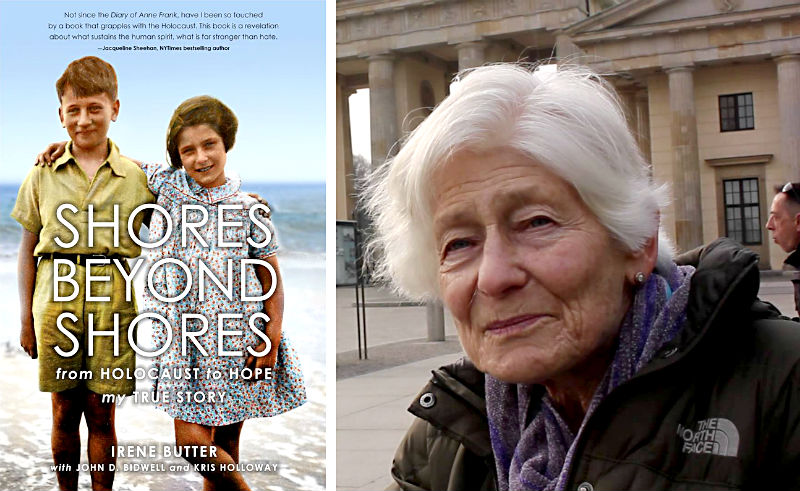Story of a Lifetime: Irene Butter shares her tale so people will never forget

This story was originally published on May 3, 2018.
Dr. Irene Butter’s entire life has been dedicated to caring for others -- as a professor, a humanitarian, a storyteller. While serving as a professor of public health at the University of Michigan, Butter spent 30 years visiting schoolchildren to tell them her tale.
"I found out that the way students relate to me is that they have experiences in their own lives when they lost a parent or grandparent or their parents divorced or suffered illnesses … they really identify with my stories and that is what is rewarding to me."
And what a story it is, now in print: Shores Beyond Shores: From Holocaust to Hope, My True Story. (Butter will be at the Ann Arbor District Library's downtown branch on May 8.)
The book begins with tales from Butter’s early life with her loving family: Pappi, Mutti, brother Werner, and her Opa and Omi, who lived nearby. But her happy home life is upset by Nazis, who forced her grandfather to surrender his bank and her father to leave his job. Eventually, the family moved to Amsterdam where Irene’s father secured a new job. The initial excitement was quickly tempered because Butter’s beloved grandparents were not able to secure proper permits to leave Germany. This loss of home and relatives was the first of several tragedies to visit young Irene in the coming decade.
Life in Amsterdam began peacefully enough -- ice-skating at a nearby park, an autograph book signed by school friends, walks along the canals. But then the changes began: Jewish children were required to surrender bicycles and were forbidden from local parks; Jews were not allowed to shop during certain hours; schools become segregated. These indignations quickly turned into something insidious as Butter’s family was forced out of their home and sent to Westerbork transit camp -- and then to Bergen-Belsen concentration camp
The reader is right there with Butter as she tries to adjust to Westerbork, watches her parents struggle after long days of forced labor, and recounts the family being forced on a train bound for the Bergen-Belsen. Butter's voice takes you to the primitive barracks, the putrid food, and the barbaric living conditions. Yet through all this Butter never stops caring for others -- her mother, other women, the little children.
The family’s eventual liberation is the beginning of another journey for Butter -- one that takes her to Africa and, in1945, America.
Her story resonated with the mostly middle and high school students who heard it despite differences of time, age, and circumstance.
"They weren’t just something that happened more than 70 years ago on another continent," Butter says. "They can connect with students over the essential themes of loss, separation, the breaking up of families.”
The students often felt inspired to share their stories with Butter, including some kids who had never met her.
“A couple of years ago, I got a letter from a boy in middle school who wrote to tell me that during that school year he had to move seven times and give up his dog," Butter says. "He said, 'I bet you will understand that,' and I did. There is trauma in everyone’s life and one thing I tried to point out was that suffering is not the end of everything. You can learn to cope, and you can get beyond it and still have a wonderful life.”
Butter says she always tried to make three points to the students: one person can make a difference, they could refuse to be enemies with people, and they should never be bystanders.
“It relates to bullying,” she says. “I would tell them that if they saw someone being mean to someone else … they couldn’t just turn their back on it. They have a responsibility to do something -- get help or support the victim, become an ally … you can’t walk away from it.”
But it's hard to be allies if people aren't aware of the problems, and recent studies have shown a decline in the number of people who are familiar with the horrors of the Holocaust. “Unfortunately, I’ve gotten letters from students who tell me that after they met me, they went home and told their parents," Butter says, "and their parents said they had not heard about the Holocaust and knew nothing about it.”
Education is the key, and while Michigan law requires that the Holocaust and genocide be taught as part of public education curriculum, it's one of the few states that has this in place.
“Students need an entire unit on this,” Butter says. “There are books for all ages and if money allows, then field trips to the Holocaust museum. But the biggest impact for students is for them to listen to a survivor. ... Survivors are not going to be around forever.”
This fact is part of what led her to write the book.
“I realized how important it is to provide testimony and to be witness to what happened," Butter says. "I spent more than three decades talking to students and I thought, well, someday when I can’t be there to talk to them, they will have my book and the story can go on.”
Patti F. Smith is a special education teacher and writer who lives in Ann Arbor with her husband and cat.
Dr. Irene Butter will read from and sign her book "Shores Beyond Shores: From Holocaust to Hope, My True Story" at the downtown branch of the Ann Arbor District Library on May 8 from 7-8:30 pm.


































